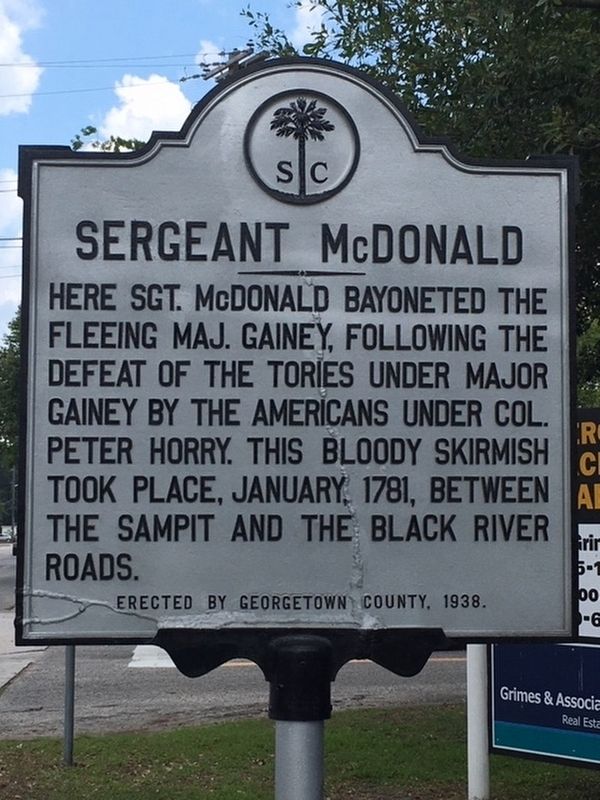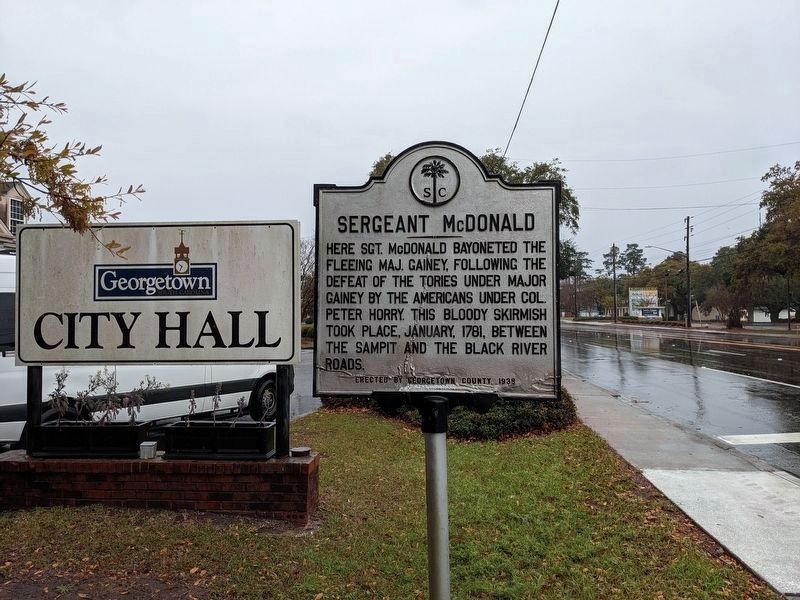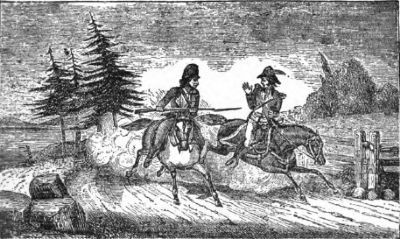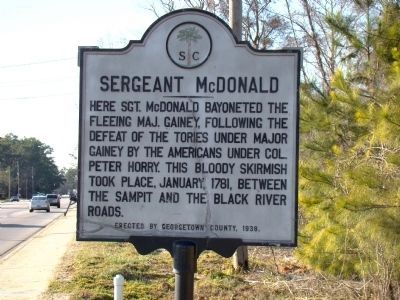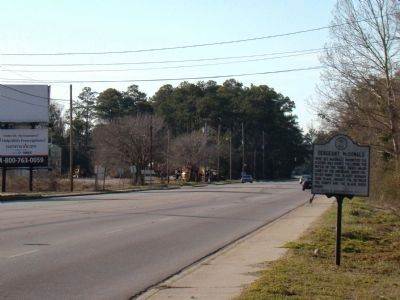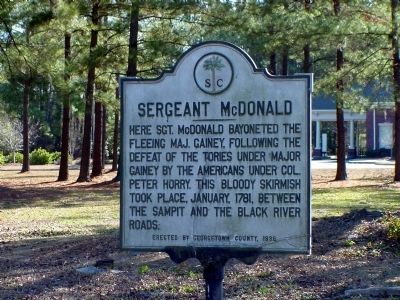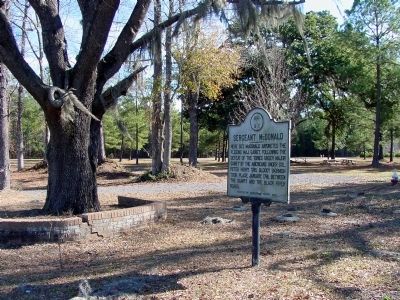Georgetown in Georgetown County, South Carolina — The American South (South Atlantic)
Sergeant McDonald
Erected 1938 by Georgetown County. (Marker Number 22-12.)
Topics. This historical marker is listed in this topic list: War, US Revolutionary. A significant historical year for this entry is 1781.
Location. 33° 23.379′ N, 79° 17.335′ W. Marker is in Georgetown, South Carolina, in Georgetown County. Marker is at the intersection of North Frazer Street (Alternate U.S. 17) and Indigo Avenue and Anthuan Maybank Drive, on the right when traveling north on North Frazer Street. It is in front of City Hall. Touch for map. Marker is in this post office area: Georgetown SC 29440, United States of America. Touch for directions.
Other nearby markers. At least 8 other markers are within 2 miles of this marker, measured as the crow flies. Friendly Aid Society / Rosemont School (approx. 0.4 miles away); Potter's Field (approx. 1.1 miles away); Winyah Schools (approx. 1.2 miles away); First Baptist Church (approx. 1.2 miles away); Mount Olive Baptist Church (approx. 1.2 miles away); Howard School (approx. 1.3 miles away); Gabriel Marion (approx. 1.3 miles away); Bethesda Baptist Church (approx. 1.3 miles away). Touch for a list and map of all markers in Georgetown.
More about this marker. The marker is back at the corner of Indigo Avenue, except that that the intersection with Indigo avenue is now one block south from where it used to be. It was moved here in 2019. It was originally erected at 33° 23.433′ N, 79° 17.333′ W. in a shaded park. Between 2008 and 2019 this historical marker was placed on High Market Street west of Ridge Street at 33° 23.217′ N, 79° 18.817′ W.
Regarding Sergeant McDonald. Major Gainey, with the bayonet in him, continued at gallop and survived.
Additional commentary.
1. Sergeant Donald M’Donald
The lives of men who have won a great name on the field of battle throw a glamor over themselves which is both interesting and fascinating; and those treading the same path but cut off in their career are forgotten. However, the American Revolution affords many acts of heroism performed by those who did not command armies, some of whom performed many acts worthy of record. Perhaps, among the minor officers none had such a successful run of brilliant exploits as Sergeant Macdonald, many of which are sufficiently well authenticated. Unfortunately the essential particulars relating to him have not been preserved. The warlike deeds which he exhibited are recorded in the “Life of General Francis Marion” by General Horry, of Marion’s brigade, and Weems. Just how far Weems romanced may never be known, but in all probability what is related concerning Sergeant Macdonald is practically true, save the shaping up of the story.
Sergeant Macdonald is represented to have been a son of General Donald Macdonald, who headed the Highlanders in North Carolina, and met with an overwhelming defeat at Moore’s Creek Bridge. The son was a remarkably stout, red-haired young Scotsman, cool under the most trying difficulties, and brave without a fault. Soon after the defeat and capture of his father he joined the American troops and served under General Horry. One day General Horry asked him why he had entered the service of the patriots. In substance he made the following reply:
“Immediately on the misfortune of my father and his friends at the Great Bridge, I fell to thinking what could be the cause; and then it struck me that it must have been owing to their own monstrous ingratitude. ‘Here now,’ said I to myself, ‘is a parcel of people, meaning my poor father and his friends, who fled from the murderous swords of the English after the massacre at Culloden.’ Well, they came to America, with hardly anything but their poverty and mournful looks. But among this friendly people that was enough. Every eye that saw us, had pity; and every hand was reached out to assist. They received us in their houses as though we had been their own unfortunate brothers. They kindled high their hospitable fires for us, and spread their feasts, and bid us eat and drink and banish our sorrows, for that we were in a land of friends. And so indeed, we found it; for whenever we told of the woeful battle of Culloden, and how the English gave no quarter to our unfortunate countrymen, but butchered all they could overtake, these generous people often gave us their tears, and said, ‘O! that we had been there to aid with our rifles, then should many of these monsters have bit the ground.’ They received us into the bosoms of their peaceful forests, and gave us their lands and their beauteous daughters in marriage, and we became rich. And yet, after all, soon as the English came to America, to murder this innocent people, merely for refusing to be their slaves, then my father and friends, forgetting all that the Americans had done for them, went and joined the British, to assist them to cut the throats of their best friends! ‘Now,’ said I to myself, ‘if ever there was a time for God to stand up to punish ingratitude, this was the time.’ And God did stand up; for he enabled the Americans to defeat my father and his friends most completely. But, instead of murdering the prisoners as the English had done at Culloden, they treated us with their usual generosity. And now these are
the people I love and will fight for as long as I live.”
The first notice given of the sergeant was the trick which he played on a royalist. As soon as he heard that Colonel Tarleton was encamped at Monk’s Corner, he went the next morning to a wealthy old royalist of that neighborhood, and passing himself for a sergeant in the British corps, presented Colonel Tarleton’s
compliments with the request that he would send him one of his best horses for a charger, and that he should not lose by the gift.
“Send him one of my finest horses!” cried the old traitor with eyes sparkling with joy. “Yes, Mr. Sergeant, that I will, by gad! and would send him one of my finest daughters too, had he but said the word. A good friend of the king, did he call me, Mr. Sergeant? yes, God save his sacred majesty, a good friend I am indeed, and a true. And, faith, I am glad too, Mr. Sergeant, that colonel knows it. Send him a charger to drive the rebels, hey? Yes, egad will I send him one, and as proper a one too as ever a soldier straddled....”
...Scarcely had this conversation passed when [the groom] paraded Selim; a proud, full-blooded, stately steed, that stepped as though he were too lofty to walk upon the earth. Here the old man brightening up, broke out again: “Aye! there, Mr. Sergeant, there is a horse for you! isn’t he, my boy?”
“Faith, a noble animal, sir,” replied the sergeant.
“Yes, egad! a noble animal indeed; a charger for a king, Mr. Sergeant! Well, my compliments to Colonel Tarleton; tell him I’ve sent him a horse, my young Selim, my grand Turk, do you hear, my son of thunder? And say to the colonel that I don’t grudge him either, for egad! he’s too noble for me, Mr. Sergeant. I’ve no work that’s fit for him, sir; no sir, if there’s any work in all this country that’s
good enough for him but just that which he is now going on; the driving the rebels out of the land.”
He had Selim caparisoned with his elegant new saddle and holsters, with his silver-mounted pistols. Then giving Sergeant Macdonald a warm breakfast, and loaning him his great coat, he sent him off, with the promise that he would, the next morning, come and see how Colonel Tarleton was pleased with Selim. Accordingly he waited on the English colonel, told him his name with a smiling countenance; but, to his mortification received no special notice. After partially recovering from his embarrassment he asked Colonel Tarleton how he liked his charger.
“Charger, sir?” said the colonel.
“Yes, sir, the elegant horse I sent you yesterday.”
“The elegant horse you sent me, sir?”
“Yes, sir, and by your sergeant, sir, as he called himself.”
“An elegant horse! and by my sergeant? Why really, sir, I-I-I don’t understand all this.”
“Why, my dear, good sir, did you not send a sergeant yesterday with your compliments to me, and a request that I would send you my very best horse for a charger, which I did?”
“No, sir, never!” replied the colonel; “I never sent a sergeant on any such errand. Nor till this moment did I ever know that there existed on earth such a being as you.”
The old man turned black in the face; he shook throughout; and as soon as he could recover breath and power of speech, he broke out into a torrent of curses, enough to make one shudder at his blasphemy. Nor was Colonel Tarleton much behind him when he learned what a valuable animal had slipped through his hands.
When Sergeant Macdonald was asked how he could reconcile the taking of the horse he replied: “Why, sir, as to
that matter, people will think differently; but for my part I hold that all is fair in war; and besides, sir, if I had not taken him Colonel Tarleton, no doubt, would have got him. And then, with such a swift strong charger as this he might do us as much harm as I hope to do them.”
Harm he did with a vengeance; for he had no sense of fear; and for strength he could easily drive his sword through cap and skull of an enemy with irresistible force. He was fond of Selim, and kept him to the top of his metal; Selim was not much his debtor; for, at the first glimpse of a red-coat, he would paw, and champ his iron bit with rage; and the moment of command, he was off among them like a thunderbolt. The gallant Highlander never stopped to count the number, but would dash into the thickest of the fight, and fall to hewing and cutting down like an uncontrollable giant.
General Horry, when lamenting the death of his favorite sergeant said that the first time he saw him fight was when the British held Georgetown; and with the sergeant the two set out alone to reconnoitre. The two concealed themselves in a clump of pines near the road, with the enemy’s lines in full view. About sunrise five dragoons left the town and dashed up the road towards the place where the heroes were concealed. The face of Sergeant Macdonald kindled up with the joy of battle. “Zounds Macdonald,” said General Horry, “here’s an odds against us, five to two.” “By my soul now captain,” he replied, “and let ’em come on. Three are welcome to the sword of Macdonald.” When the dragoons were fairly opposite, the two, with drawn sabres broke in upon them like a tornado. The panic was complete; two were immediately overthrown, and the remaining three wheeled about and dashed for the town, applying the whip and spur to their steeds. The sergeant mounted
upon the swift-footed Selim out-distanced his companion, and single-handed cut down two of the foe. The remaining one would have met a like fate had not the guns of the fort protected him. Although quickly pursued by the relief, the sergeant had the address to bring off an elegant horse of one of the dragoons whom he had killed.
A day or two after the victory of General Marion over Colonel Tynes, near the Black river, General Horry took Captain Baxter, Lieutenant Postell and Sergeant Macdonald, with thirty privates, to see if some advantage could not be gained over the enemy near the lines of Georgetown. While partaking of a meal at the house of a planter, a British troop attempted to surprise them. The party leaped to their saddles and were soon in hot pursuit of the foe. While all were excellently mounted, yet no horse could keep pace with Selim. He was the hindmost when the race began, but with widespread nostrils, long extended neck, and glaring eyeballs, he seemed to fly over the course. Coming up with the enemy Sergeant Macdonald drew his claymore, and rising on his stirrups, with high-uplifted arm, he waved it three times in circles over his head, and then with terrific force brought it down upon the fleeing dragoon. One of the British officers snapped his pistol at him, but before he could try another the sergeant cut him down. Immediately after, at a blow apiece, three more dragoons were brought to the earth by the resistless claymore. Of the twenty-five, not a man escaped, save one officer, who struck off at right angles, for a swamp, which he gained, and so cleared himself. So frightened was Captain Meriot, the British officer, that his hair, from a bright auburn, before night, had turned gray.
On the following day General Horry encountered one third of Colonel Gainey’s men, and in the encounter the latter lost one half his men who were
in the action. In the conflict, as usual the sergeant performed prodigies of valor. Later in the day Colonel Gainey’s regiment again commenced the attack, when Sergeant Macdonald made a dash for the leader, in full confidence of getting a gallant charger. Colonel Gainey proved to have been well mounted; but the sergeant, regarding but the one enemy passed all others. He afterwards said he could have slain several in the charge, but wished for no meaner object than their leader. Only one, who threw himself in the way, became his victim, whom he shot down as they went at full speed along the Black river road. When they reached the corner of Richmond fence, the sergeant had gained so far upon his enemy, as to be able to plunge his bayonet into his back. The steel parted from the gun, and, with no time to extricate it, Colonel Gainey rushed into Georgetown, with the weapon still conspicuously showing how close and eager had been the charge, and how narrow the escape. The wound was not fatal.
On another occasion General Marion ordered Captain Withers to take Sergeant Macdonald, with four volunteers, and search out the intentions of the enemy in Georgetown. On the way they stopped at a wayside house and drank too much brandy. Sergeant Macdonald, feeling the effects of the potion, with a red face, reined up Selim, and drawing his claymore, began to pitch and prance about, cutting and slashing the empty air, and cried out, “Huzza, boys! let’s charge!” Then clapping spurs to their steeds these six men, huzzaing and flourishing their swords, charged at full tilt into a town garrisoned by three hundred British. The enemy supposing this was the advance guard of General Marion, fled to their redoubts; but all were not fortunate enough to reach that haven, for several were overtaken and cut down in the streets, among whom was a sergeant-major, who fell from a back-handed stroke of a claymore dealt by Sergeant Macdonald. Out of the town the young men galloped without receiving any injury.
Not long after the above incident, the sergeant, as usual employing himself in watching the movements of the British, climbed up into a bushy tree, and thence, with a musket loaded with pistol bullets, fired at the guard as they passed by; of whom he killed one man and badly wounded Lieutenant Torquano; then sliding down the tree, mounted belim, and was soon out of harm’s way. Repassing the Black river he left his clothes behind him, which were seized by the enemy. He sent word to Colonel Watson if he did not immediately send back his clothes, he would kill eight of his men to compensate for them. He felt it was a point of honor that he should recover his clothes. Colonel Watson greatly irritated by a late defeat, was furious at the audacious message. He contemptuously ordered the messenger to return; but some of his officers, aware of the character of the sergeant, urged that the clothes might be returned to the partisan, as he would positively keep his word. Colonel Watson yielded, and when the messenger returned to the sergeant, he said, “You may now tell Colonel Watson that I will kill but four of his men.”
The last relation of Sergeant Macdonald, as given by General Peter Horry, is in reference to Captains Snipes and McCauley, with the sergeant and forty men, having surprised and cut to pieces a large party of the enemy near Charleston.
Sergeant Macdonald did not live to reap the fruit of his labors, or even to see his country free. He was killed at the siege of Fort Motte, May 12, 1781. In this fort was stationed a British garrison of one hundred and fifty men under Captain McPherson, which had been reinforced by a small force of dragoons sent from Charleston with dispatches for lord Rawdon. General Marion, with the assistance of Colonel Henry Lee, laid siege to the fortress, which was compelled to surrender, owing to the burning of the mansion in the center of the works. Mrs. Rebecca Motte, the lady that owned the mansion, furnished the bow and arrows used to carry the fire to the roof of the building. Nathan Savage, a private in the ranks of General Marion’s men, winged the arrow with the lighted torch. The British did not lose a man, and General Marion lost two of his bravest—Lieutenant Cruger and Sergeant Macdonald. His resting place is unknown. No monument has been erected to his memory ; but his name will endure so long as men shall pay respect to heroism and devotion to country.
—Excerpted from the 1900 book A Historical Account of the Settlements of the Scotch Highlanders in America Prior to the Peace of 1783 by J. P. MacLean, Ph.D.
— Submitted April 29, 2008, by J. J. Prats of Powell, Ohio.
Credits. This page was last revised on March 31, 2023. It was originally submitted on April 29, 2008, by J. J. Prats of Powell, Ohio. This page has been viewed 2,699 times since then and 70 times this year. Photos: 1. submitted on August 22, 2019, by Randy Tucker of Greenville, South Carolina. 2. submitted on March 28, 2023, by Bruce InCharlotte of Charlotte, North Carolina. 3. submitted on April 30, 2008, by J. J. Prats of Powell, Ohio. 4, 5. submitted on February 22, 2009, by J. J. Prats of Powell, Ohio. 6, 7. submitted on April 29, 2008, by J. J. Prats of Powell, Ohio.
